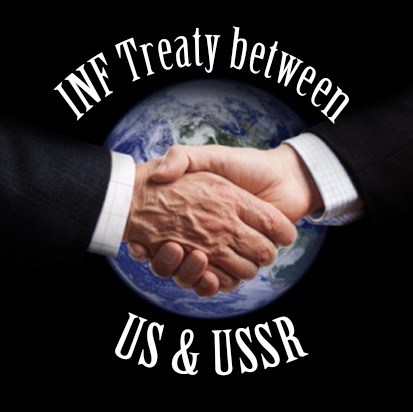In my last post, I discussed the groups that are encouraging the federal government to develop a new nuclear warhead and launch vehicle called the Long-Range Stand Off cruise missile. Ironically, just after writing that post I came across an article that said Obama was accusing the Russians of violating a treaty when they tested a new ground launched long range nuclear cruise missile. So presumably, if the U.S. developed the new missiles it would be in violation of the same treaty that the U.S. is accusing the Russians of violating.
The Intermediate-Range Nuclear Forces (INF) Treaty was signed in 1987 by the United States and the Soviet Union. The U.S. Congress ratified the treaty in 1988 and it went into effect on June 1 of that year. The treaty calls for the elimination of nuclear and conventional ground-launched ballistic and cruise missiles with ranges between three hundred and thirty four hundred miles.
The Soviet Union fell in 1991 and Russia assumed control of the old Soviet nuclear arsenal. In 2007, the Russian President, Vladimir Putin, stated that he did not believe that the INF Treaty "served Russia's interests." A week later, the Russian military's chief of general staff said that Russia could pull out of the INF Treaty. He said that the Russian decision on the INF Treaty would depend on the actions of the U.S. with respect to a proposed Ground-Based Midcourse Defense missile defense system, parts of which the U.S. had been planning to deploy in Poland and the Czech Republic. Those plans were abandoned in favor of a different missile system. The American Enterprise Institute has suggested that the real reason that the Russians are concerned about the INF Treaty is that China is not a signatory. China continues to develop missile systems that are banned in the U.S. and Russia.
In 2012, the U.S. accused the Russians of violating the treaty. The missiles that triggered the U.S. charges were the R-500 cruise missiles and a short range ICBM. This month, the U.S. formally notified the Russians that they were in violation of the INF Treaty. Russian official responded by reiterating that the INF treaty was unsuitable for Russia because other Asian countries were not bound by the treaty and were developing the banned weapons systems.
The U.S. is working on the Prompt Global Strike (PGS) system in an attempt to get around the INF Treaty provisions. Currently, a nuclear attack could hit any target in the world in under an hour. Any conventional weapons response to hostilities could take days to weeks to mobilize. The PGS project is dedicated to developing the ability to strike any target in the world in an hour with conventional weapons.
While I applaud treaties to prevent the spread and use of nuclear weapons, our experience seems to be that treaties are often broken or circumvented at the whim of the signatories. The complete elimination of nuclear weapons should be our focus, not the banning of very specific types of warheads and delivery systems.
